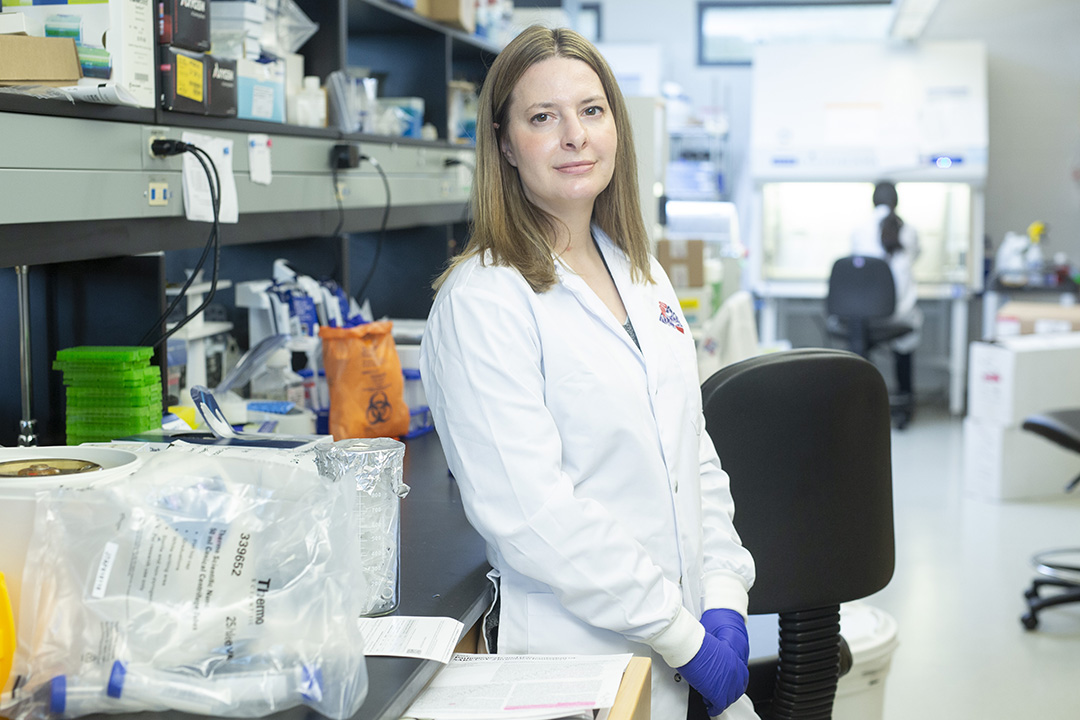
VIDO research provides insight into the immune response and possible long-term health impacts associated with COVID-19
One of the newest scientists at the University of Saskatchewan’s (USask) Vaccine and Infectious Disease Organization (VIDO) has published new research on potential lasting effects of COVID-19.
Dr. Alyson Kelvin (PhD) came to VIDO in February 2020 as a visiting scientist to access the containment level 3 facilities and conduct research to help develop potential solutions to COVID-19. In July 2020, she was seconded from her position at Dalhousie University, and has since decided to stay at VIDO, officially joining the team this August.
“I am excited to join the VIDO team. As an infectious disease researcher in Canada, VIDO was known to me as the place to do world-class work on emerging and re-emerging viruses of high consequence,” said Kelvin. “I came to VIDO as a visiting scientist but immediately knew that the solutions to the COVID-19 pandemic could be developed here in Saskatchewan. With VIDO as my research home, I look forward to helping to develop healthcare solutions for Canada.”
Some of Kelvin’s COVID-19 research projects conducted at VIDO were recently published and are outlined below:
Nonagenarians and centenarians recovering from COVID-19 produce virus-blocking antibodies
Kelvin, with collaborators at VIDO and Dalhousie University, investigated how advanced age impacts the immune responses and protection against SARS-CoV-2, the virus that causes COVID-19. The study involved individuals more than 90 years of age, including some older than 100, that were residents at a long-term care facility in Halifax, Nova Scotia, Canada that experienced a COVID-19 outbreak.
Using VIDO’s containment level 3 facility it was determined that study participants recovering from COVID-19 had antibodies that were able to neutralize the SARS-CoV-2. This response lasted at least 60 days from the initial infection suggesting the immune response from older individuals may protect against SARS-CoV-2 re-infection. This is the first study of the immune responses to SARS-CoV-2 infection in people more than 100 years of age. Understanding the immune responses to SARS-CoV-2 in older individuals is of significant public health importance, especially for long-term care facilities.
Read the full publication in EClinicalMedicine
Disease model may give insight into COVID-19 “long-haulers”
Up to one-third of individuals who have recovered from COVID-19 continue to report symptoms including fatigue, shortness of breath, difficulty concentrating, headache, and inability to exercise, for weeks, months, or a year after infection.
To investigate the range of clinical symptoms, as well as “long-haulers disease”, the research team used the hamster model of COVID-19 developed at VIDO. Kelvin’s research found inflammation around the heart, in the kidneys and large intestines 14 days after infection.
This evidence of multiorgan injury provides a way to study the range of health issues associated with COVID-19, the recovery, and the possible long-term health implications. Future studies are planned to better understand these potential long-term impacts and to identify and assess possible therapeutics and therapies.
Read the full publication in PLOS Pathogens
“Part of establishing VIDO as Canada’s Centre for Pandemic Research involves recruiting scientists leading world-class research programs,” said Andrew Van Kessel, VIDO associate director of research. “We are happy that Dr. Kelvin will join our growing team focused on emerging infectious diseases.”
VIDO’s containment level 3 facility is a national research facility with subsidized access available to researchers across Canada through support from the Canada Foundation for Innovation Major Science Initiatives fund. To review access requirements please visit https://www.vido.org/facilities/accessing-intervac
